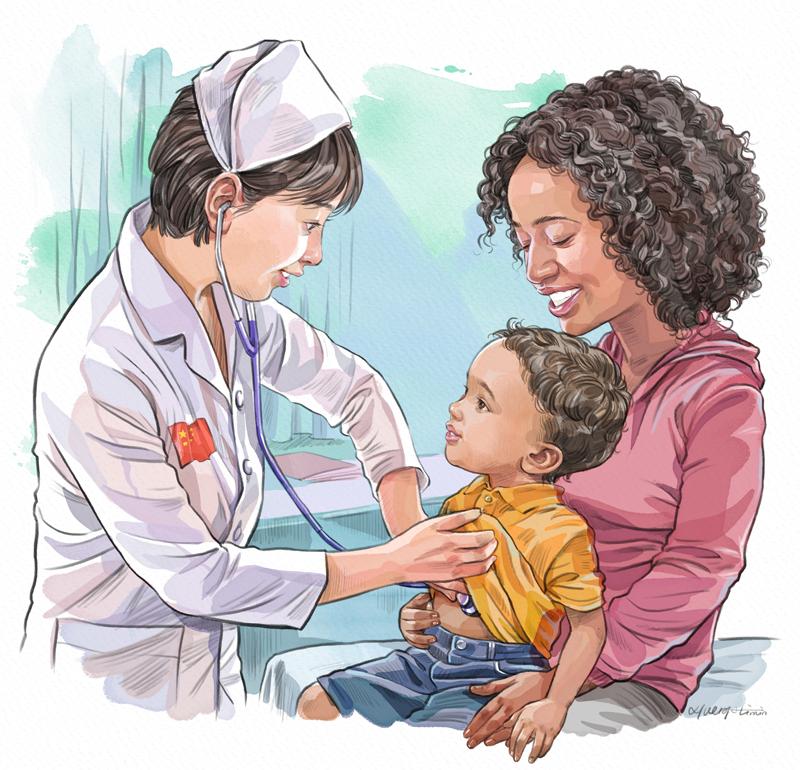A summary of the situation of Chinese medical team in foreign aid: National Health Commission

By Li Min/China Daily
The year of 2018 marks the 55th anniversary of the establishment of Chinese medical team. Over the past 55 years, medical team members dedicated themselves in foreign medical aid and played an irreplaceable role in strengthening the friendship and cooperation between China and recipient countries.
1. The history of Chinese medical team
In 1963, at the invitation of the government of Algeria, China sent the first foreign medical aid team to Algeria, launching off the history of Chinese medical team’s assistance to foreign countries. After the reform and opening up in 1978, with the continuous expansion of China's foreign exchanges, the number of medical teams sent to other developing countries gradually started to increase. By July 2018, China had sent foreign medical teams to 71 countries in Asia, Africa, Latin America, Europe and Oceania, with a total of 26000 medical members, treating approximately 280 million patients.
2. The current status of Chinese medical team
At present, China has sent medical teams to 56 countries (45 in Africa), 1095 medical members are stationed in 111 medical points. 1809 medical members received various national honors such as the Presidential Medal issued by the recipient governments. 27 provincial regions in the country are responsible for sending medical teams in foreign aid. The Chinese medical teams are made up of doctors from internal medicine, surgical department, gynecology department and pediatrics department. Some doctors are experts in Western medicine while others specialize in traditional Chinese medicine.
Medical team members generally take turns every one or two years to aid foreign countries. China also annually donates parts of drugs and medical devices with the dispatch of Chinese medical teams.
3. Achievements of Chinese medical team
During the past 55 years, Chinese medical teams have wholeheartedly provided quality medical services to the people in developing countries. They have not only cured a number of contagious diseases, common diseases and frequently-occurring diseases but also carried out difficult operations such as cardiac surgery, tumor removal and amputated limb replantation, successfully saving many lives of endangered patient. Chinese doctors have treated numerous difficult and severe diseases with traditional Chinese medical techniques and diagnostic and therapeutic methods of integrated Chinese and Western Medicines to the recipient countries.
They not only undertook treatment tasks but also taught local medical staff medical skills by clinical teaching, joint surgery and giving lectures and training.
Since 2010, Chinese medical team has carried out the “Bright Journey” event in more than 20 countries in Asia, Africa and Caribbean area; it has reached cooperative relationship with 23 counterpart hospitals, jointly established a number of demonstrative medical centers such as heart center, minimally invasive surgical center and ophthalmic center; it has trained a number of medical staff and carried out maternal and child health projects to help relevant countries to enhance maternal and child health guarantee ability.
In 2014, Ebola broke out in West Africa. China dispatched more than 1200 medical staff to fight against the epidemic with people in the affected countries and eventually they completely came out victorious in the fight against Ebola, helping China win wide praises from the international community. Ever since, China has enhanced public health assistance to foreign countries by sending teams of experts to help countries such as Angola, Guyana and Madagascar to prevent and control yellow fever, Zika and other plague outbreaks; supporting the construction of the African Centers for Disease Control and Prevention; assisting African countries to build public health systems that are appropriate to their national conditions and levels of development.
Chinese medical team has become an example of long-term cooperation between China and third world countries, making great contributions to promote the medical development of recipient countries, improving people’s health condition and enhance friendship and trust between the Chinese people and the people of developing countries.

Follow us on WeChat
京ICP备18041594号-1
京公网安备 11010202005508号

Follow us on WeChat


